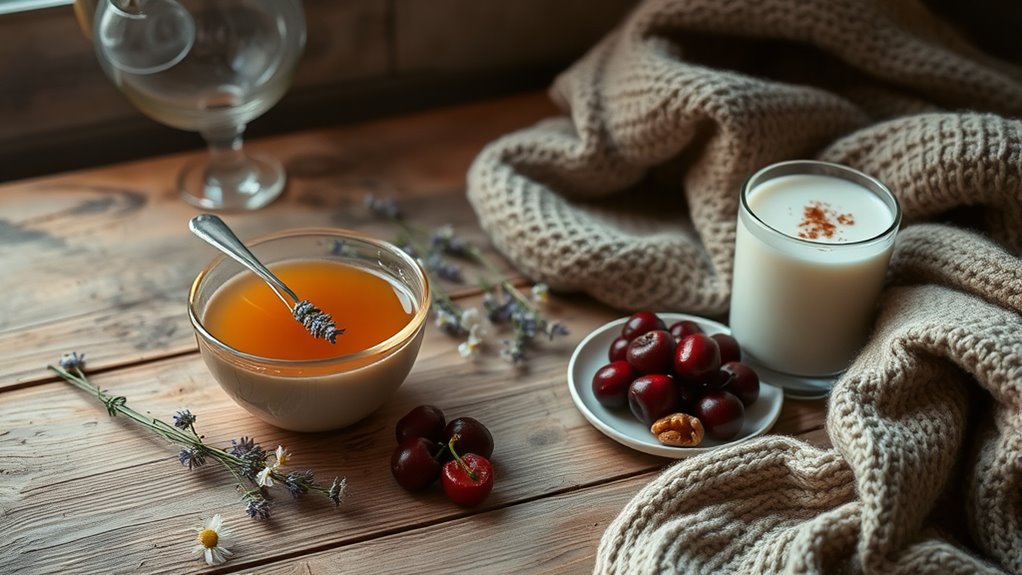To support quality sleep, include magnesium-rich foods like leafy greens, nuts, and seeds, along with tryptophan sources such as turkey, chicken, and dairy before bed. Sipping warm milk or herbal teas like chamomile and valerian root can help you relax, while tart cherry juice boosts melatonin levels. Avoid caffeine and sugary drinks in the evening. If you want to discover more simple ways to improve your sleep, keep exploring effective food and drink options.
Key Takeaways
- Consume magnesium-rich foods like nuts, seeds, and leafy greens to promote relaxation and improve sleep quality.
- Drink warm milk or herbal teas such as chamomile or valerian root to help soothe and prepare your body for sleep.
- Incorporate tart cherry juice, a natural source of melatonin, about an hour before bed to support sleep onset and duration.
- Avoid caffeine and sugary drinks in the evening to prevent disruptions in sleep patterns and maintain restful sleep.
- Small dietary adjustments, including tryptophan-rich foods like turkey and dairy, can help facilitate faster and deeper sleep.

Getting a good night’s sleep is essential for your health and well-being, and what you eat or drink can play a crucial role in how well you rest. Certain foods contain sleep promoting nutrients that help your body relax and prepare for rest, making it easier to fall asleep and stay asleep throughout the night. Incorporating these nutrients into your diet, especially through bedtime beverage options, can substantially improve your sleep quality.
Prioritize sleep-enhancing foods and drinks to relax your body and improve your sleep quality naturally.
For example, foods rich in magnesium, like nuts, seeds, and leafy greens, are known for their calming effects. Magnesium helps regulate neurotransmitters that promote relaxation and sleep, so including a handful of almonds or a spinach salad in your evening meal can be beneficial. Tryptophan, an amino acid found in turkey, chicken, and dairy products, is another sleep-promoting nutrient. It serves as a precursor to serotonin and melatonin—the hormones responsible for mood regulation and sleep-wake cycles. Consuming these foods a few hours before bed can make a noticeable difference in how quickly you drift off.
When it comes to bedtime beverage options, there are several drinks that can enhance your sleep. Warm milk is a classic choice, thanks to its tryptophan content and comforting warmth, which can help signal to your brain that it’s time to wind down. Herbal teas like chamomile and valerian root are also popular because they contain natural compounds that promote relaxation and reduce anxiety, easing your transition into sleep. Tart cherry juice is another excellent option; it’s a natural source of melatonin, which can help regulate your sleep cycle. Drinking a small glass of tart cherry juice about an hour before bed may improve sleep onset and duration.
Avoid caffeine and sugary drinks in the hours leading up to bedtime, as they can interfere with your ability to fall asleep and reduce sleep quality. Instead, opt for soothing, sleep-promoting beverages that help you relax. Hydrate earlier in the evening, so you’re not waking up to use the bathroom during the night, but don’t neglect the importance of a calming drink in your pre-sleep routine. Additionally, understanding the importance of natural sleep aids can help you choose effective options to support restful sleep.
Incorporating sleep promoting nutrients through your diet and choosing the right bedtime beverage options can make a real difference in your sleep quality. Small adjustments in what you eat and drink before bed can help you fall asleep faster, enjoy deeper sleep, and wake up feeling more refreshed. Pay attention to how your body responds to these changes, and over time, you’ll find the perfect combination to support restful nights.
Frequently Asked Questions
Can Certain Foods Improve Sleep Without Causing Weight Gain?
You might wonder if certain foods can boost your sleep without adding weight. The good news is, healthy snack options and nutrient-dense choices can help. Foods like almonds, Greek yogurt, or cherries provide sleep-promoting nutrients without excess calories. Incorporate these into your diet to support restful sleep while maintaining a healthy weight. Making mindful choices guarantees you get the benefits without the risk of unwanted weight gain.
Are There Any Beverages That Can Help With Falling Asleep Faster?
While it might seem like a simple solution, some beverages can gently nudge you toward sleep. Herbal teas like chamomile or valerian root relax your mind and body, making it easier to drift off. Warm milks contain tryptophan, which promotes sleepiness. Drinking these a little before bed creates a calming routine, helping you fall asleep faster naturally without relying on harsh remedies.
Do Sleep-Supporting Foods Differ for Adults and Children?
You might wonder if sleep-supporting foods differ for adults and children. Cultural dietary differences influence the types of foods available, but age-specific nutritional needs are key. For children, foods rich in magnesium, calcium, and tryptophan support growth and sleep. Adults benefit from similar nutrients, but portion sizes and specific foods may vary. Tailoring sleep-friendly foods to age guarantees you meet nutritional needs while promoting restful sleep.
How Long Before Bed Should I Eat These Sleep-Friendly Foods?
You should plan your evening snack about 30 to 60 minutes before bed to optimize sleep. This timing of carbohydrate intake helps boost serotonin and melatonin production, promoting relaxation. Opt for sleep-friendly foods like a small banana with a handful of nuts or whole-grain toast. Keep your evening snack light and avoid heavy, greasy foods to prevent discomfort and improve sleep quality, making it easier to fall asleep peacefully.
Can Supplements Replace Foods for Better Sleep Quality?
You wonder if supplements can replace foods for better sleep quality. While supplements might boost certain nutrients, their efficacy varies, and they shouldn’t replace a balanced diet. Achieving dietary balance provides a broader range of nutrients essential for sleep. Relying solely on supplements could lead to gaps in your nutrition. For peak sleep, it’s best to use supplements as a complement, not a substitute, for a nutritious, balanced diet.
Conclusion
If you want better sleep, choosing the right foods and drinks can make a big difference. Incorporate items like almonds, chamomile tea, and cherries into your nightly routine. Did you know that about 70 million Americans suffer from sleep disorders? By making simple dietary changes, you can improve your sleep quality and wake up feeling refreshed. Don’t underestimate the power of what you eat and drink—your better night’s sleep is within reach.









